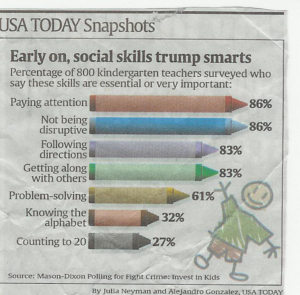
Dr. Nikki Edge is a professor at the University of Arkansas for Medical Sciences in the Department of Family and Preventive Medicine. She researches factors that influence child social and emotional outcomes and evaluates interventions for high-risk children and families. In part two of our Breaking Down Brain Science blog, she answers our questions about the importance of high-quality child care’s effects on brain development.
Are there skills, beyond literacy and math, that are part of early brain development?
So in the very first months of life the language and communication centers of the brain are rapidly growing. By 12 months, that burst of growth starts to slow down. As a child moves into the toddler and preschool years (2-5), now we move into development of the brain in ways that support higher order cognitive functions that we are going to need to be successful in the process of learning and the process of working lifelong. This part of the brain development is especially essential to something we call executive function skills.
What are executive function skills?

Executive functions skills are called that because they are the skills folks need to be successful at work. It is the same set of skills that supports the process of learning. People liken it to the air traffic control center of our brain. We have to keep a lot of planes in the air at once. That takes a lot of focus, it takes ignoring distractions, it takes keeping track of things and prioritizing, organizing and planning, managing timelines, adapting to the unexpected, solving problems, getting along and working as a team and keeping our emotions under control so we don’t get overwhelmed. These are executive function skills.
Turns out that these are the same skills that support learning. I like to share the results of a large survey of kindergarten teachers, which tell us that these are the essential skills for kindergarten success. We have to have them before we hit kindergarten if we want to be successful in school.
And by the way, these are also the skills we need to be successful at anything in the workplace. American companies face a growing skills gap. This isn’t just technical skills.These are soft skills like time management, problem solving and communication. Just like executive function skills support the ‘how’ of learning, they support the ‘how’ we succeed at a job…any job. So, they are just as important in the workforce as they are in the kindergarten classroom.
What can we do to support early brain development for children in Arkansas?
It’s like a house. We start with a foundation, then create rooms before adding electrical and plumbing. Brains are built one step at a time and the early years are the foundation.
If children don’t get the support they need to build a strong foundation, we can keep on building, but we are building on a weak foundation! And like a house we can make repairs later but it will be expensive and time consuming (often requiring mental health or special education services for example). It will be easier and less expensive to build it right in the first place.
We support early brain development with strategies that ensure children have access to consistent responsive caregiving, both at home and in all the environments in which they spend time. This is why high quality child care is so important. The typical child with parents who work or are in school will spend an average of 11,500 hours in child care before kindergarten. And it is in the prime brain building years. So if the nurturing is consistent enough, the environment appropriately stimulating and we keep the big stressful events out of there, then we are looking at 11,500 hours of intensive support for brain development and ultimately workforce development. If we ensure quality care for all kids, then your workforce is going to look pretty spectacular a few years from now.
